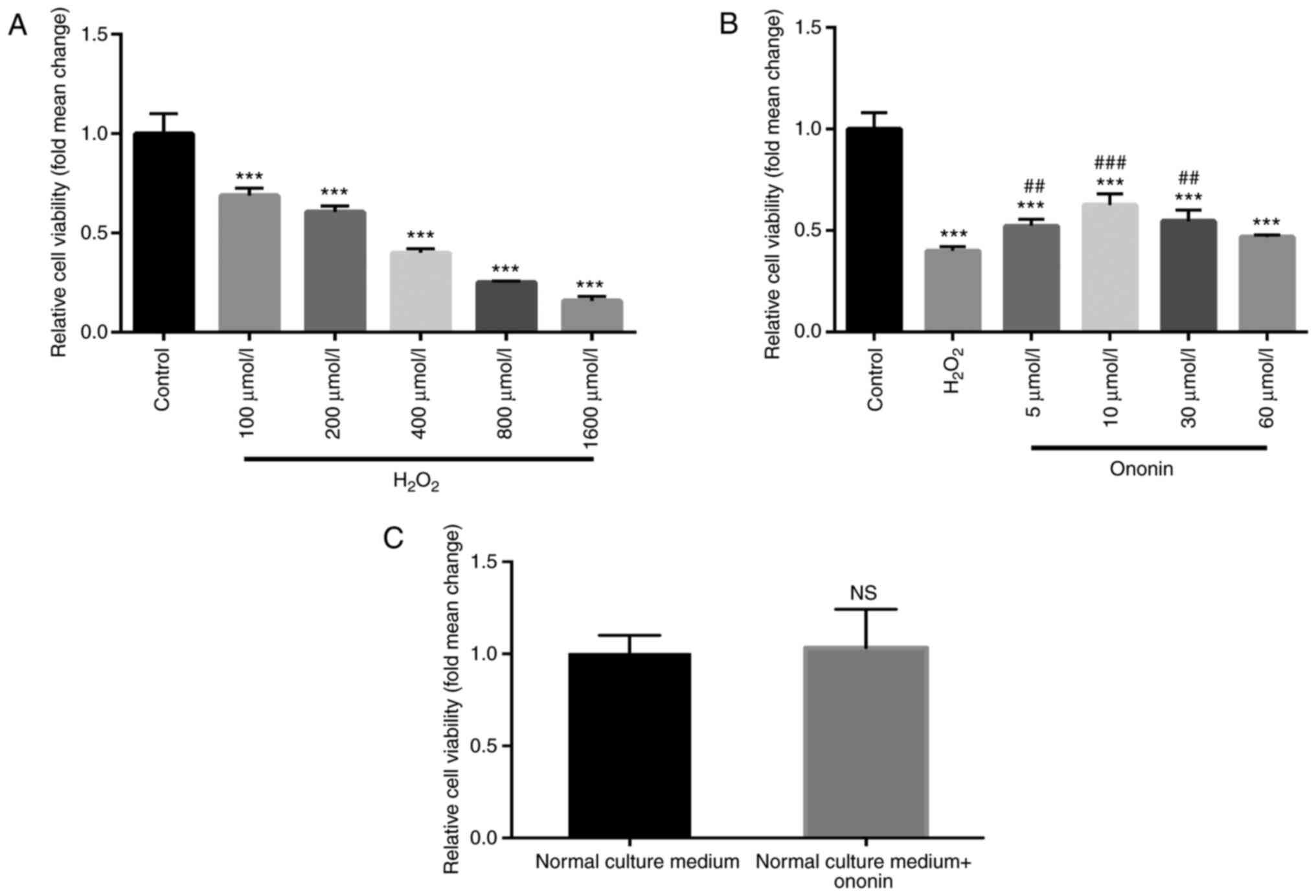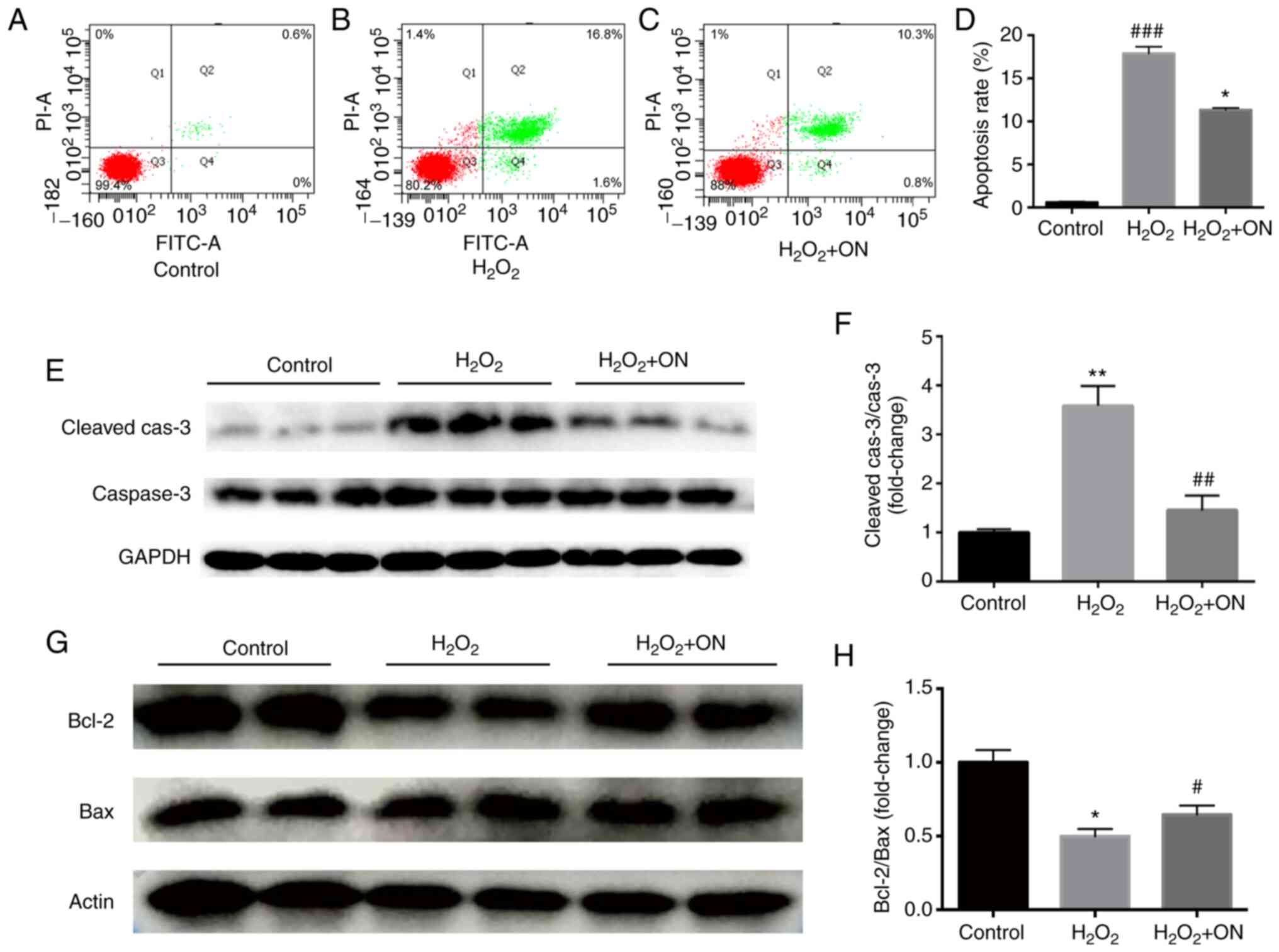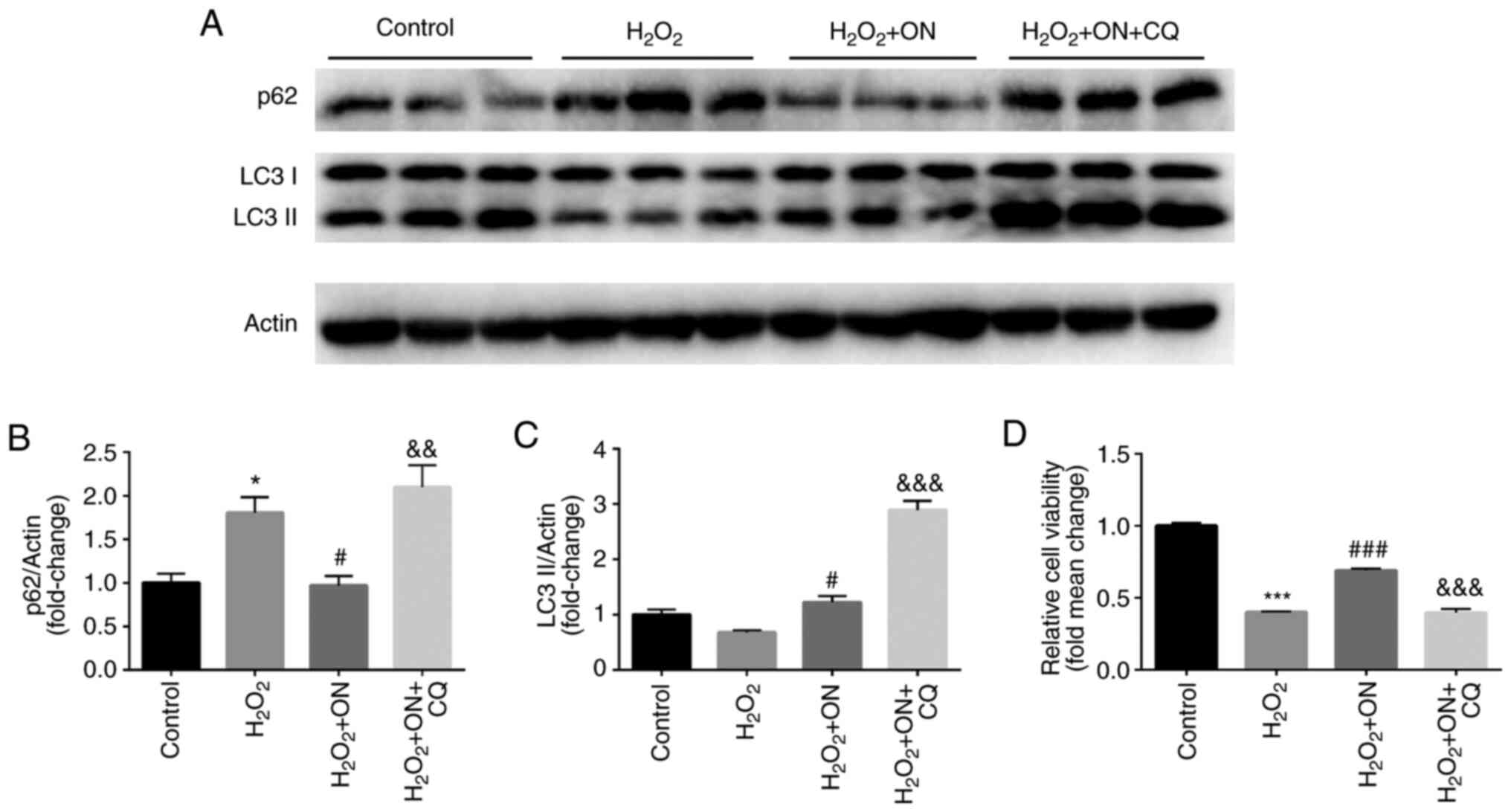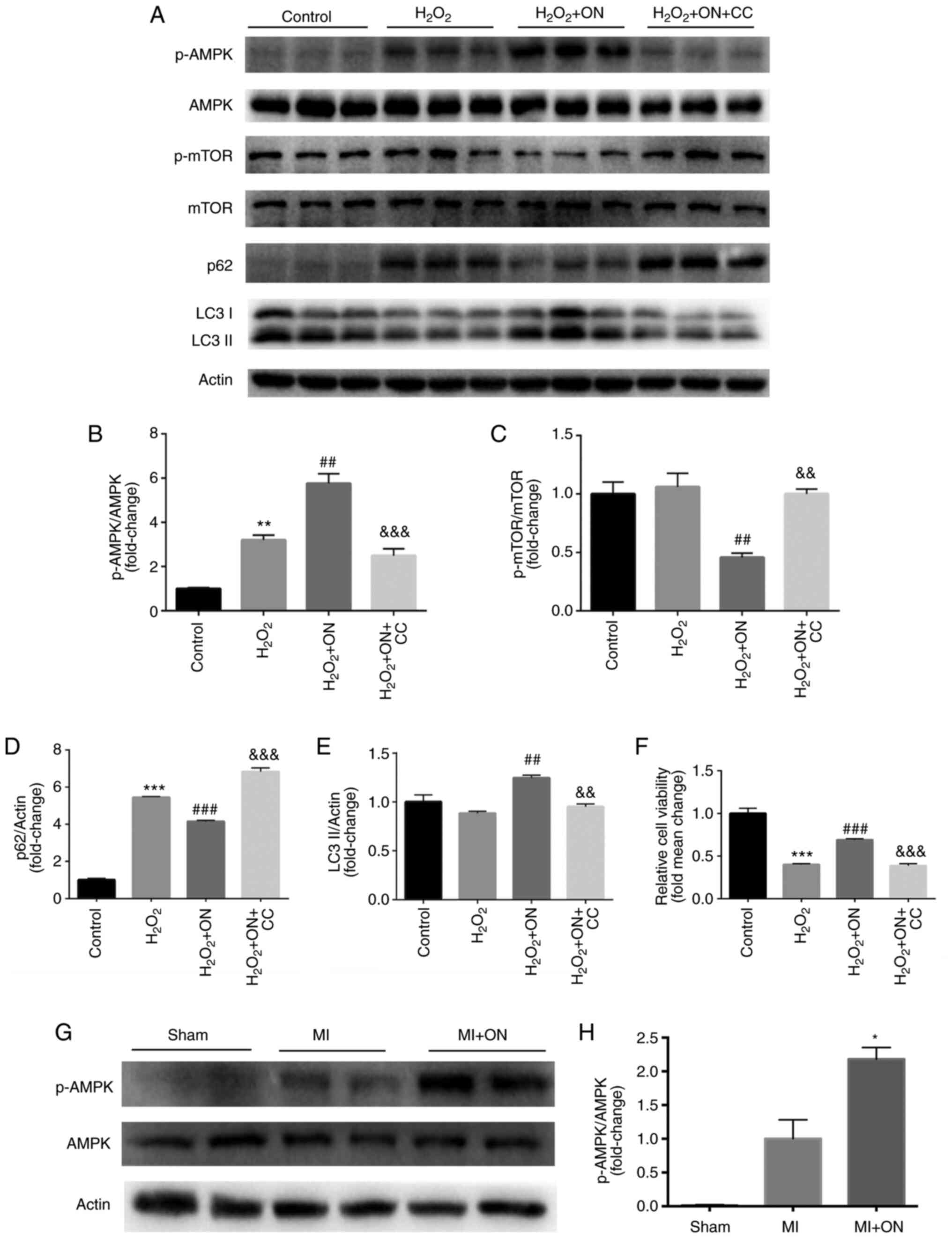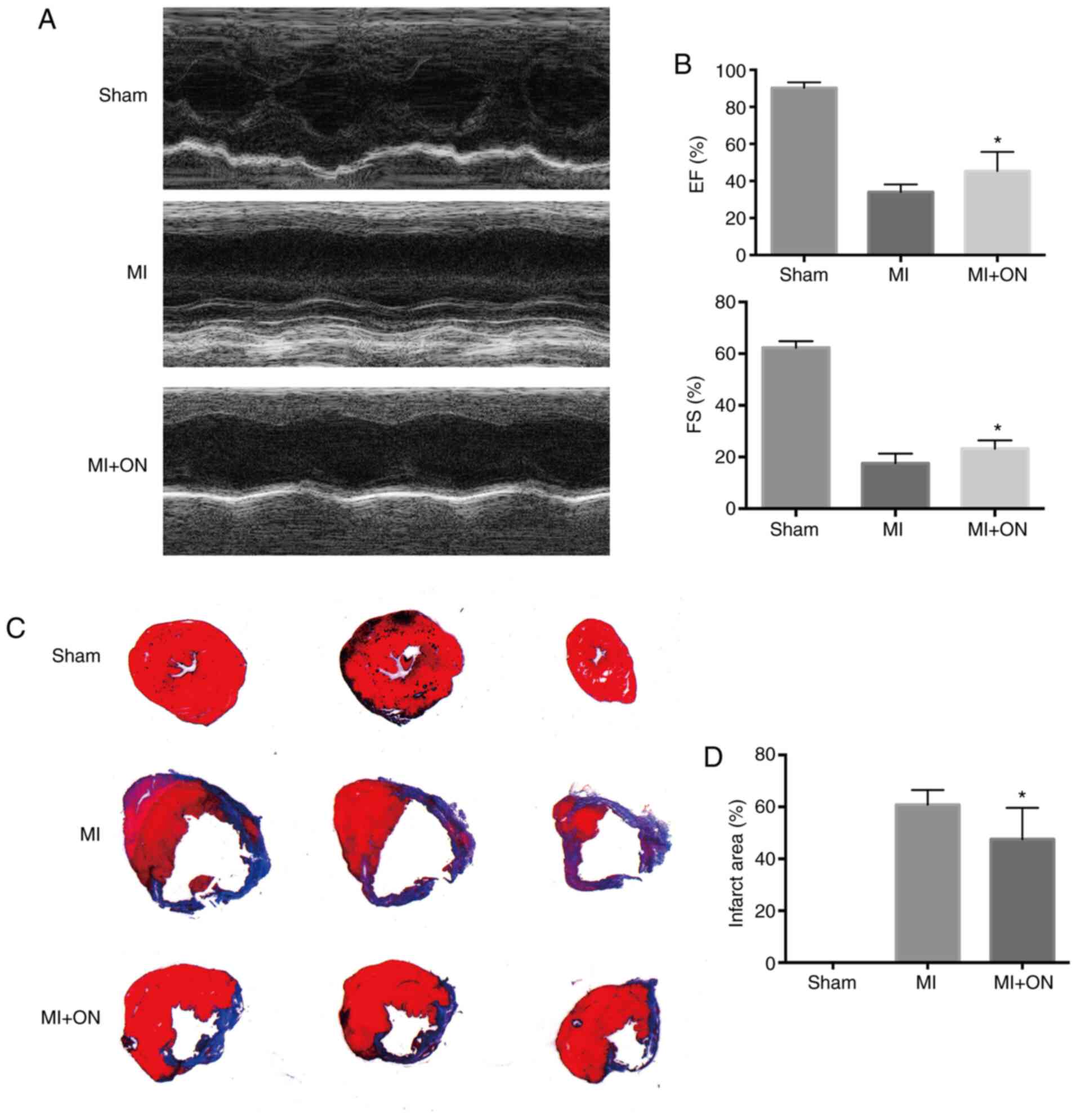|
1
|
Okwuosa IS, Lewsey SC, Adesiyun T,
Blumenthal RS and Yancy CW: Worldwide disparities in cardiovascular
disease: Challenges and solutions. Int J Cardiol. 202:433–440.
2016.PubMed/NCBI View Article : Google Scholar
|
|
2
|
Miao C, Lei M, Hu W, Han S and Wang Q: A
brief review: The therapeutic potential of bone marrow mesenchymal
stem cells in myocardial infarction. Stem Cell Res Ther.
8(242)2017.PubMed/NCBI View Article : Google Scholar
|
|
3
|
Aljakna A, Fracasso T and Sabatasso S:
Molecular tissue changes in early myocardial ischemia: From
pathophysiology to the identification of new diagnostic markers.
Int J Legal Med. 132:425–438. 2018.PubMed/NCBI View Article : Google Scholar
|
|
4
|
Saha S, Panigrahi DP, Patil S and Bhutia
SK: Autophagy in health and disease: A comprehensive review. Biomed
Pharmacother. 104:485–495. 2018.PubMed/NCBI View Article : Google Scholar
|
|
5
|
Levine B and Kroemer G: Autophagy in the
pathogenesis of disease. Cell. 132:27–42. 2008.PubMed/NCBI View Article : Google Scholar
|
|
6
|
Wu D, Zhang K and Hu P: The role of
autophagy in acute myocardial infarction. Front Pharmacol.
10(551)2019.PubMed/NCBI View Article : Google Scholar
|
|
7
|
Woodall BP and Gustafsson ÅB: Autophagy-A
key pathway for cardiac health and longevity. Acta Physiol (Oxf).
223(e13074)2018.PubMed/NCBI View Article : Google Scholar
|
|
8
|
Munson MJ and Ganley IG: MTOR, PIK3C3, and
autophagy: Signaling the beginning from the end. Autophagy.
11:2375–2376. 2015.PubMed/NCBI View Article : Google Scholar
|
|
9
|
Al-Bari MAA and Xu P: Molecular regulation
of autophagy machinery by mTOR-dependent and -independent pathways.
Ann NY Acad Sci. 1467:3–20. 2020.PubMed/NCBI View Article : Google Scholar
|
|
10
|
Sciarretta S, Forte M, Frati G and
Sadoshima J: New insights into the role of mTOR signaling in the
cardiovascular system. Circ Res. 122:489–505. 2018.PubMed/NCBI View Article : Google Scholar
|
|
11
|
Jia J, Bissa B, Brecht L, Allers L, Choi
SW, Gu Y, Zbinden M, Burge MR, Timmins G, Hallows K, et al: AMPK, a
regulator of metabolism and autophagy, is activated by lysosomal
damage via a novel galectin-directed ubiquitin signal transduction
system. Mol Cell. 5:951–969. 2020.PubMed/NCBI View Article : Google Scholar
|
|
12
|
Messina M: A brief historical overview of
the past two decades of soy and isoflavone research. J Nutr.
140:1350S–1354S. 2010.PubMed/NCBI View Article : Google Scholar
|
|
13
|
Luo LY, Fan MX, Zhao HY, Li MX, Wu X and
Gao WY: Pharmacokinetics and bioavailability of the isoflavones
formononetin and ononin and their in vitro absorption in ussing
chamber and caco-2 cell models. J Agric Food Chem. 66:2917–2924.
2018.PubMed/NCBI View Article : Google Scholar
|
|
14
|
Mu H, Bai YH, Wang ST, Zhu ZM and Zhang
YW: Research on antioxidant effects and estrogenic effect of
formononetin from trifolium pratense (red clover). Phytomedicine.
16:314–319. 2009.PubMed/NCBI View Article : Google Scholar
|
|
15
|
Dong L, Yin L, Zhang Y, Fu X and Lu J:
Anti-inflammatory effects of ononin on
lipopolysaccharide-stimulated RAW 264.7 cells. Mol Immunol.
83:46–51. 2017.PubMed/NCBI View Article : Google Scholar
|
|
16
|
Sun Q, Kang Z, Cai J, Liu W, Liu Y, Zhang
JH, Denoble PJ, Tao H and Sun X: Hydrogen-rich saline protects
myocardium against ischemia/reperfusion injury in rats. Exp Biol
Med (Maywood). 234:1212–1219. 2009.PubMed/NCBI View Article : Google Scholar
|
|
17
|
Li DL and Hill JA: Cardiomyocyte autophagy
and cancer chemotherapy. J Mol Cell Cardiol. 71:54–61.
2014.PubMed/NCBI View Article : Google Scholar
|
|
18
|
Wang Y, Liu Z, Shu S, Cai J, Tang C and
Dong Z: AMPK/mTOR signaling in autophagy regulation during
cisplatin-induced acute kidney injury. Front Physiol.
11(619730)2020.PubMed/NCBI View Article : Google Scholar
|
|
19
|
Ganguly S, Mitra A and Sarkar S: Role of
α-crystallin B in regulation of stress induced cardiomyocyte
apoptosis. Cardiovasc Hematol Agents Med Chem. 12:60–65.
2014.PubMed/NCBI View Article : Google Scholar
|
|
20
|
Del Re DP, Amgalan D, Linkermann A, Liu Q
and Kitsis RN: Fundamental mechanisms of regulated cell death and
implications for heart disease. Physiol Rev. 99:1765–1817.
2019.PubMed/NCBI View Article : Google Scholar
|
|
21
|
Broughton KM, Wang BJ, Firouzi F,
Khalafalla F, Dimmeler S, Fernandez-Aviles F and Sussman MA:
Mechanisms of cardiac repair and regeneration. Circ Res.
122:1151–1163. 2018.PubMed/NCBI View Article : Google Scholar
|
|
22
|
Lundstrom K: Unlocking the therapeutic
potential of plant extracts. Future Med Chem. 8:245–248.
2016.PubMed/NCBI View Article : Google Scholar
|
|
23
|
Luo L, Zhou J, Zhao H, Fan M and Gao W:
The anti-inflammatory effects of formononetin and ononin on
lipopolysaccharide-induced zebrafish models based on lipidomics and
targeted transcriptomics. Metabolomics. 15(153)2019.PubMed/NCBI View Article : Google Scholar
|
|
24
|
Choy KW, Murugan D, Leong XF, Abas R,
Alias A and Mustafa MR: Flavonoids as natural anti-inflammatory
agents targeting nuclear factor-Kappa B (NFκB) signaling in
cardiovascular diseases: A mini review. Front Pharmacol.
10(1295)2019.PubMed/NCBI View Article : Google Scholar
|
|
25
|
Wu MY, Li CJ, Hou MF and Chu PY: New
insights into the role of inflammation in the pathogenesis of
atherosclerosis. Int J Mol Sci. 22(2034)2017.PubMed/NCBI View Article : Google Scholar
|
|
26
|
Li Y, Xia J, Jiang N, Xian Y, Ju H, Wei Y
and Zhang X: Corin protects H2O2-induced
apoptosis through PI3K/AKT and NF-κB pathway in cardiomyocytes.
Biomed Pharmacother. 97:594–599. 2018.PubMed/NCBI View Article : Google Scholar
|
|
27
|
D'Arcy MS: Cell death: A review of the
major forms of apoptosis, necrosis and autophagy. Cell Biol Int.
43:582–592. 2019.PubMed/NCBI View Article : Google Scholar
|
|
28
|
Galluzzi L, Vitale I, Aaronson SA, Abrams
JM, Adam D, Agostinis P, Alnemri ES, Altucci L, Amelio I, Andrews
DW, et al: Molecular mechanisms of cell death: Recommendations of
the nomenclature committee on cell death 2018. Cell Death Differ.
25:486–541. 2018.PubMed/NCBI View Article : Google Scholar
|
|
29
|
Ryter SW, Mizumura K and Choi AMK: The
impact of autophagy on cell death modalities. Int J Cell Biol.
2014(502676)2014.PubMed/NCBI View Article : Google Scholar
|
|
30
|
Wang K: Autophagy and apoptosis in liver
injury. Cell Cycle. 14:1631–1642. 2015.PubMed/NCBI View Article : Google Scholar
|
|
31
|
Chung KW and Chung HY: The effects of
calorie restriction on autophagy: Role on aging intervention.
Nutrients. 11(2923)2019.PubMed/NCBI View Article : Google Scholar
|
|
32
|
Glick D, Barth S and Macleod KF:
Autophagy: Cellular and molecular mechanisms. J Pathol. 221:3–12.
2010.PubMed/NCBI View Article : Google Scholar
|
|
33
|
Wang Y and Zhang H: Regulation of
autophagy by mTOR signaling pathway. Adv Exp Med Biol. 1206:67–83.
2019.PubMed/NCBI View Article : Google Scholar
|
|
34
|
Coward J, Ambrosini G, Musi E, Truman JP,
Haimovitz-Friedman A, Allegood JC, Wang E, Merrill AH Jr and
Schwartz GK: Safingol (L-threo-sphinganine) induces autophagy in
solid tumor cells through inhibition of PKC and the PI3-kinase
pathway. Autophagy. 5:184–193. 2009.PubMed/NCBI View Article : Google Scholar
|
|
35
|
Mrakovcic M and Fröhlich LF: p53-mediated
molecular control of autophagy in tumor cells. Biomolecules.
8(14)2018.PubMed/NCBI View Article : Google Scholar
|
|
36
|
Lee SY, Ku HC, Kuo YH, Chiu HL and Su MJ:
Pyrrolidinyl caffeamide against ischemia/reperfusion injury in
cardiomyocytes through AMPK/AKT pathways. J Biomed Sci.
22(18)2015.PubMed/NCBI View Article : Google Scholar
|
|
37
|
Lei X, Wu Q, Leng W, Wu M, Chen L and
Liang Z: Exenatide reduces cardiomyocyte apoptosis by stimulating
adiponectin secretion and activating APPL1-AMPK-PPARα axis. Ann
Transl Med. 7(326)2019.PubMed/NCBI View Article : Google Scholar
|
|
38
|
Li R, Liu Y, Shan YG, Gao L, Wang F and
Qiu CG: Bailcalin protects against diabetic cardiomyopathy through
keap1/Nrf2/AMPK-mediated antioxidative and lipid-lowering effects.
Oxid Med Cell Longev. 2019(3206542)2019.PubMed/NCBI View Article : Google Scholar
|















